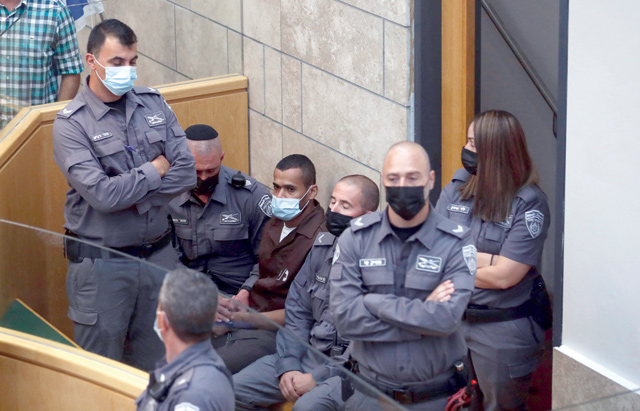OCCUPIED JERUSALEM — All six Palestinians who escaped an Israeli high-security jail through a tunnel dug under a sink are back in custody, after the forces said on Sunday they had recaptured the last two.
The inmates, who were being held for attacks against Israel, became heroes among many Palestinians when reports emerged they had burrowed out using tools as basic as a spoon.
The full weight of Israel's security apparatus was deployed to catch them, including aerial drones, road checkpoints and an army mission to Jenin in the occupied West Bank where many of the men grew up.
The huge manhunt lasted almost a fortnight, with the first four fugitives recaptured last week.
The Israel Defence Forces said on Sunday the remaining two had surrendered "after being surrounded by security forces" that had acted with precision on accurate intelligence.
The men, 35-year-old Ayham Kamamji and 26-year-old Munadel Infeiat, are both members of Islamic Jihad, an armed Palestinian Islamist movement.
Islamic Jihad hailed its "heroes" following the re-arrests, vowing the Palestinian people "will not surrender" in response to Israeli "criminality and aggression".
The pair were arrested in a joint operation with counterterrorism forces in Jenin and were "currently being interrogated", the Israeli forces statement said.
Two other men who had allegedly helped the fugitives were also detained, it added.
'Major mishap'
Taleb Abo Jaafar, who owns the Jenin house in which the two fugitives were found, said he had been surprised to discover his home cordoned off in the middle of the night.
"There was shooting around the house. I went out to see what happened, I opened the door and looked at the street, the forces were outside and they told me to go back inside," he told AFP.
In a call on Sunday with Israeli security chiefs, Prime Minister Naftali Bennett branded the escape "a major mishap".
“But you mobilised with joint forces until the mission was completed,” he added, vowing in a separate statement that the security establishment would “correct what needs to be corrected”.
All six fugitives were members of Palestinian groups who were convicted by Israeli courts of plotting or carrying out attacks against Israelis.
Kamamji, originally from Kafr Dan near Jenin, was arrested in 2006 and jailed for life for the kidnap and murder of a young Israeli settler, Eliahu Asheri.
Islamic Jihad said Kamamji suffered abdominal and intestinal illness in jail and was subject to “medical negligence” by prison authorities.
Infeiat, arrested last year, had been jailed multiple times previously for his role in the armed group, and was awaiting sentencing at the time of the escape.
Hiding in lorry park
The other four men recaptured last week included Mahmoud Abdullah Ardah, the alleged mastermind of the escape, and Zakaria Zubeidi, who headed the armed wing of the Fateh movement of Palestinian President Mahmoud Abbas.
Zubeidi was found hiding in a lorry park just outside Nazareth in northern Israel along with one of the other men, Mohammad Ardah, who was sentenced to life in prison in 2002 for his role in Islamic Jihad’s armed wing.
The remand of the four was extended at Nazareth’s magistrates’ court to September 29 in a Sunday hearing, police said.
‘Spoon of freedom’
Questions remain over how jailbreak could have happened, and a formal inquiry has been announced.
A lawyer for Yaqub Qadri, the sixth escapee, told Palestinian television that the inmates had not planned to escape when they did on September 6.
She said they rushed ahead with the plan on that day because they feared guards had become suspicious and noticed changes in their cell.
The break-out had been planned for months, Ardah’s lawyer told AFP, saying that “Mahmoud told me he started digging in December”.
Ardah told him he used spoons, plates and even the handle of a kettle to dig the tunnel from his jail cell.
Spoons have since become a symbol of Palestinian resistance, with protesters both inside and outside the Palestinian territories carrying them at demonstrations.
They have inspired political artwork as far away as Kuwait, where artist Maitham Abdal has sculpted a giant hand clasping what he labelled the “spoon of freedom”.
